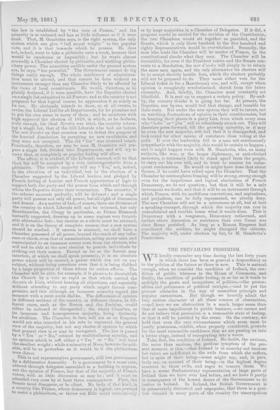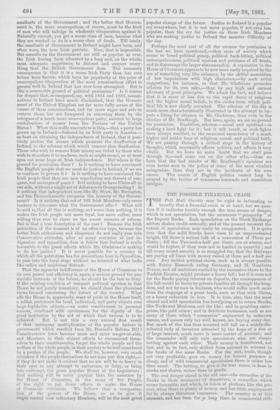THE PREVAILING PESSIMISM.
WE hardly remember any time during the last forty years in which there has been so general a despondency as
to the politics of the future as there is now. This is natural enough, when wo consider the condition of Ireland, the con- dition of public b'lsiness in the House of Commons, and. finally, the condition of public feeling, in so far as it tends to multiply the gnats and mosquitoes of politics,—the person- alities and pettinesses of political intrigue,—and to put the gravest obstacles in the way of masculine principle and popular earnestness. But though we heartily admit the very serious character of all these sources of obstruction, —and hero we use obstruction in a much larger sense than that of mere impediment to public business,—we cannot and do not believe that pessimism is a reasonable state of feeling, or that it will be justified by the event. On the contrary, we hold that even the very circumstances which seem most to justify pessimism, exhibit, when properly considered, grounds for the most reasonable confidence that we are passing on into a better stage, instead of retrograding into a worse. Take, first, the condition of Ireland. No doubt, the anxious,. the more than anxious, the perilous symptom of the pre- sent moment, is this,—that Ireland is in anarchy not because her rulers are indifferent to the evils from which she suffers,. but in spite of their being—some might. say, and, in part, truly say, on account of their being—in the highest degree sensitive to those evils, and eager to remove them. We have a worse Parliamentary representation of large parts of Ireland than we have ever had before, and we have it partly in consequence of the honest desire of the Government to do justice to Ireland. In Ireland, the British Government is so permanently distrusted and unpopular, that there is a posi- tive demand in many parts of the country for unscrupulous
assailants of the Government ; and the better that Govern- ment is, the more unscrupulous, of course, must be the kind of men who will indulge in wholesale vituperation against it. Naturally enough, you get a worse class of men, because what they are wanted to do is a worse class of deeds. Till lately, the assailants of Government in Ireland might have been, and often were, the true Irish patriots. Now, that is impossible. But assaults on the Government are still as popular as ever, the Irish having been educated by a long and, on the whole, most adequate experience, to distrust and suspect every- thing that the British Government does. The necessary consequence is that it is a worse Irish Party than has ever before been known, which buys its popularity at the price of unscrupulous vituperation of the most conscientious effort to govern well in Ireland that has ever been attempted. But is this a reasonable ground of political pessimism ? Is it reason for despair that, as compared, say, with 1834 and 1835' assassi- nations in Ireland have much diminished, that the Govern- ment of the United Kingdom are far more fully aware of the causes of these assassinations, and far more eager and able to remove them, but are hampered in removing them by the intrigues of a much more unscrupulous party, assisted by large contributions of money from the Fenians of the United States ? What this really amounts to is this,—that a party has grown up in Ireland—fostered by an Irish party in America— so beat on obtaining the independence of Ireland, that it posi- tively prefers the abuses which promote the disaffection of Ireland, to the reforms which would remove that disaffection. Those who wish to remove Irish misery are foiled by those who wish to stimulate it to madness, such as might secure, or at least open out some hope of, Irish independence. Butlwhere is the ground for pessimism there I Is it nothing to have convinced the English people that we must do justice to Ireland, if we are to continue to govern it ? Is it nothing to have convinced the Irish people that they are now repudiating not throats of con- quest, but messages of peace ? Is it nothing to have Ulster all on our side, without a'single act of deference to Orange feeling ? Is it nothing that independent men like Mr. Shaw, Mr. Essington, and the Blennerhassetts recognise the honesty of the Govern- ment? Is it nothing that out of 103 Irish Members only seven venture to denounce what the Government offer ? What will be said is, that all this is nothing, and worse than nothing, if it makes the Irish people not more loyal, but more sullen, more willing than ever to cheer on the secret enemies of reform. But is that a true description of the case I Because the Irish patriotism of the moment is of an offensive type, because the better Irish enthusiasm and eloquence do not easily pass into Conservative attitudes, after so many centuries of just in- dignation and opposition, does it follow that Ireland is really insensible to the great efforts which Mr. Gladstone is making to do her justice ? It is never possible for a country in which all the patriotism has for generations been in Opposition, to pass into the loyal stage without an interval of what looks like sullen and suspicious distrust.
That the apparent indifference of the House of Commons to its own power and efficiency is, again, a serious ground for pes- simistic forecasts of the future, we should be the last to deny. If the existing condition of rampant political egotism in that House be not purely transitory, we should share the gloomiest views formed concerning the future of the country. What ails the House is, apparently, want of pride in the House itself, a selfish preference for local, individual, and party objects over large legislative objects,—an acute sensitiveness to personal success, combined with carelessness for the dignity of the great institution by the aid of which that success is to be achieved. But is not this a very natural first result of that enormous multiplication of the popular factors in government which resulted from Mr. Disraeli's Reform Bill? Constituencies have become more and more un-get-at-able, and Members, in their violent efforts to recommend them- selves to their constituencies, forget the whole people and the welfare of the whole people, in their anxiety to be well considered by a portion of the people. We shall be, however, very much mistaken if the people themselves do not soon put this right,— if they do not make it evident that no sin will be so heavy in their eyes as any attempt to embarrass, or delay, or bring into contempt, the great popular House of the Legislature ; that nothing will be more popular than the assertion by the House of Commons, in the name of the People, of the right to put down efforts to make the House of Commons ridiculous. We believe that a reorganisa- tion of the powers of the House, so as to give it ample control over refractory Members, will be the next great popular change of the future. Justice to Ireland is a popular cry everywhere, but it is not more popular, if not even less popular, than the cry for justice on those Irish Members who are making justice to Ireland the monster difficulty of the day.
Perhaps the most real of all the excuses for pessimism is the last we have mentioned,—that state of society which seems to breed political gossip, political back-biting, political unscrupulousness, political egotism and pettiness of all kinds, and to discourage the larger statesmanship. A reputation in the House of Commons appears to be now more easily acquired by the use of something very like calumny, by the skilful association of low imputations with high characters,—by such artful suggestions, for instance, as that Mr. Gladstone promotes atheism for its own sake,—than by any high and earnest advocacy of great principles. We admit the fact, and believe that it is more or less due to the rapid decay of religious and the higher moral beliefs, in the circles from which poli- tical life is now chiefly recruited. The atheism of the day is much more characteristically illustrated in the attempt to im- pute a liking for atheism to Mr. Gladstone, than oven in the election of Mr. Bradlaugh. But here, again, we see no ground for pessimism. Doubtless, atheism—moral and spiritual—is making a hard fight for it ; but it will result, as such fights have always resulted, in the recovered ascendancy of a much higher and nobler tone of religious, moral, and political faith. We are passing through a critical stage in the history of thought, which necessarily affects politics, and affects it very vitally. But we have no more doubt that we shall pass through it,—and come out on the other side,—than we have that the bad results of Mr. Bradlaugh's opinions are even better seen in the policy of some of his most virulent antagonists, than they are in the incidents of his own
career. The course of English politics cannot long be swayed by the tactics of venomous innuendo and scandalous intrigue.



































 Previous page
Previous page